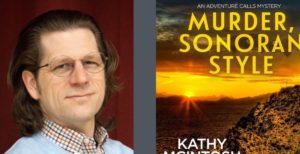
The Life and Challenges of an Audio Book Narrator
I recently had the opportunity to interview Allen B. Ellis, the narrator for Murder, Sonoran Style, the audio book released earlier this year. He was an adept narrator and I wanted to share a bit more about Allen, his background and his take on narrating audio books.
About Allen: Allen B. Ellis has taught music in the Boise, Idaho, area for over 20 years. Since 2000, he has scratched his music theatre itch by performing alongside his wife (and, later, their children) in his local community theatre company, playing roles from Charlie Brown to Jean Valjean. An early interest in audiobook narration was rekindled in 2020 when Allen was invited by a local audio pro to audition for a series of audiobooks. After that, he was hooked. When he’s not working, he’s playing: percussion in church and community bands, roles on stage, or board games with his family.
Q: Narrating audio books, alone in a studio, seems like a big leap from teaching. Are there similar challenges? What’s different from teaching?
A: I’m going into my 22nd year of music education and my 9th year at my current school, where I teach middle and high school bands and choirs. Teaching and narrating are similar in that both require preparation. I had to lose the illusion a long time ago that audiobook narration was as simple as pressing “record” and reading aloud.
Another similarity (and I’m not sure what my fellow teachers think about this) is that in my experience teaching and conducting a musical ensemble IS THEATRE. I’ve had days where teaching a class or two was just as exhausting as performing on stage—there was just a little less dancing, that’s all.
One big difference is that when I narrate, I can correct my mistakes before the book reaches the public. When I’m teaching, any mistake I make happens live in front of 25 kids. I use those opportunities, though, to help my kids learn that even adults make mistakes and that we can correct them and learn from them.
Q: How did you get started narrating audio books?
In 2008, I went to Los Angeles to participate in an audiobook workshop with renowned voice actor and teacher Pat Fraley. It was a great experience, but I didn’t turn my career that way. Fast forward to 2020. A producer friend of mine (our mutual acquaintance Sharon Larson), whom I had met through my local music theatre company, invited me to audition for an audiobook she was about to produce. I thought it sounded fun, so I did the audition and got the job. I was so excited about breaking into the business that I sought out narrator and coach Sean Pratt and started lessons.
Q: What is your process for getting to know the characters? How do you remember each character’s voice as you read along?
A: Remembering the voices has a lot to do with getting to know the characters. I like to think about who they are and what their places are in the story. The better the author has developed the character, the more easily I can get to know him or her and get into (and remember) the voice.
Q: What is the hardest part of being an audio narrator? What’s your favorite part?
A: The hardest part for me is sitting in one place for extended periods of time.
My favorite part of being a narrator just might be those times when I forget that I’m sitting in my booth, reading from my computer screen. I forget that I’m using different voices to play different parts, and I just find myself LIVING in the story. I hope my audience has a similar experience as they listen.
Q: How does acting differ from narrating audio books?
When I’m on stage I try to do my best to play the one role I have. When I narrate an audiobook, I get to play EVERY role, including the narrator, who is always a character unto himself, even if he’s not in the story, per se. Of course, when I narrate a book, I don’t have to worry about costume changes, which is great when I’m playing a big black woman in one sentence and a little white boy in the next.
Q: My novel has many characters, both male and female. How do you find the right voice for each character?
I generally start with the easy stuff: male or female? Old or young? After that, I look at what kind of a person he or she is. Excitable? Mellow? Arrogant? Gracious? Often, a character will remind me of someone I’ve known personally, so all I have to do is BE that person. Other times I may need to rely on similar characters I’ve seen in movies and TV.
Q: Is it more difficult to portray different male voices or to portray a woman’s voice?
Men’s voices generally come more naturally to me, just because I’m a man, but I wouldn’t say that women’s voices are difficult. I have a mother, a sister, a wife, two daughters, and many aunts, former teachers, colleagues, and other female acquaintances on which to base my ideas of how women typically inflect.
Q: Do you narrate the book a few chapters at a time? Explain how that works.
When I’m in Sharon’s studio [Sharon Larson is my producer], for example, we’ll have a block of time, maybe three hours set aside. (Those would be the three hours between the end of my school day and a late dinner with my wife and kids.) We’ll record a certain number of pages or chapters, taking short breaks every 25 minutes or so. The number of recording sessions will, of course, vary with the length of the book. She’ll do all the editing and uploading. My first book with her was about eight hours long, and we spent about fifteen hours in the studio.
When I produce a book myself, I usually record a chapter, correcting errors as I go, and then I go through and edit — taking out disruptive breaths, correcting mistakes that slipped by unnoticed the first time, and sometimes pushing or pulling the timing between sentences or paragraphs. After that, I export the audio file, run it through a mastering application so it will have all the right technical sound specifications, and then I upload it to the production website. Then I give myself a break and either come back for another chapter or take care of some other business around the house.
Q: Who is your favorite character? (In my novel, please!)
Probably Gabe Ramsay (I hope that’s not too obvious). I like how he wants (and usually tries) to do the right thing even when faced with difficult situations.
Q: Do the characters’ voices stay with you when you are no longer narrating?
Most of the main characters do. It’s kind of like when you see an old friend you haven’t seen in a long time, and you think, “yes, I remember your face!” When I think of a familiar character, it’s kind of like, “yes, I remember your voice!”
Thanks so much for this interview, Allen. Listeners who love your voice can find you narrating mine and other books as Allen B. Ellis on Audible.
